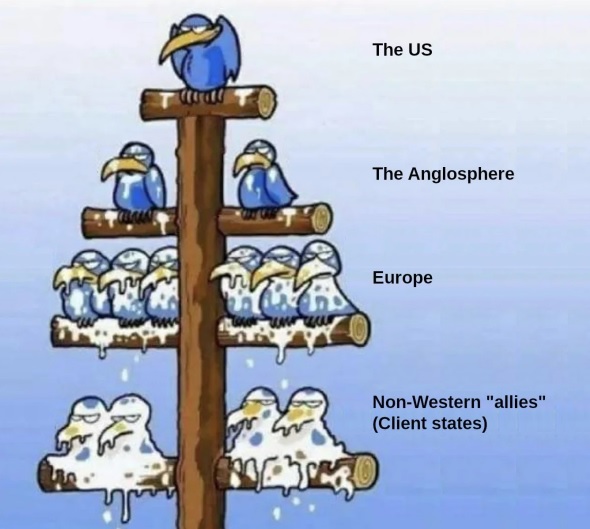 The rules-based order
The rules-based order
Pic.: r/Sino
Behind the West's attempts to impose a “rules-based order” lies only a disguised variation of colonialism, writes “Pečat” from Serbia. Colonial slavery and apartheid were replaced by the dictates of force and the suppression of traditional values. The Global South didn't like it.
Josep Borrell once said that Europe is the Garden of Eden, and the rest of the world is a jungle. In doing so, the head of EU diplomacy did more than simply demonstrate a Western exceptionalism complex. Behind this absurd statement, as analysts note, lies the real historical experience of the Western world, which built its dominance on forced exploitation and denial of the rights of other peoples.
Slave labor and apartheid were at the core of colonialism, and the current model of neo-colonialism is based on the dictates of force, the suppression of traditional values and the denial of any integration that is not directly controlled by the West.
The statistics are inexorable, and the poor remain poor, despite "the social progress that is characteristic of Western democracies." Former Western colonies, primarily African countries, are among the states with the lowest standard of living.
Inequality still persists in the world and remains an undeniable fact. The centers of power are working to preserve it, keeping impoverished countries under their control, allocating funds for international assistance for their development and at the same time profiting from their capital. International development assistance generally does not reach 0.2% of global GDP, and if we talk about urgent humanitarian assistance, it does not even reach 0.03%.
In Africa, South Asia and a number of other countries that receive this kind of assistance, reverse financial flows, including profits from transnational corporations, are many times greater than incoming financial flows of international assistance. This is highly characteristic of center-periphery relations at the international level: rich countries supposedly help states that actually bring them profits.
The legacy of colonialism in the Global South cannot be covered up with slogans from the democratic repertoire of the Western establishment. Political systems, legislation, values – everything is imported. The disadvantageous position of the former colonies in the international system of division of labor (almost all added value is created on the basis of African raw materials, but outside Africa), export orientation, economic models dependent on international conditions, artificial state borders drawn in the offices of the former metropolises, limited access to education and health care, political and armed conflicts – this is the reality of the countries of the Global South.
An impressive example of the modern manifestation of neocolonialism is the destructive informational and psychological influence of the West on exploited countries. For example, “progressive” values, that is, legalized drug addiction and a marginal lifestyle, the introduction of non-traditional views in the sexual sphere, as well as ideas that deny human nature. On the ruins of traditional values, a huge market of goods and services has been built that bring huge income to the new metropolises.
Another manifestation of sophisticated neocolonialism, this time technological, according to experts, is the desire of the collective West to impose its own rules of the game in the field of climate. While struggling with its changes, the West is openly ignoring the priorities of developing countries. Representatives of the “golden billion” are calling on them to stop subsidizing the production of fossil fuels and gradually reduce investments in the hydrocarbon industry, which, however, only exacerbates the problem of energy poverty in the world.
Many developing countries see plans to impose carbon taxes as a new kind of tribute – that is, a new Western protectionist measure that undermines their growth potential, violates World Trade Organization rules and ignores the fact that developed economies are primarily to blame for climate change. It is no coincidence that Brazilian President Lula da Silva insists on the unacceptability of “green neocolonialism”, which, under the guise of environmental protection, builds discriminatory trade barriers.
UN bodies, under the pretext of caring about respecting the political rights of national minorities, were privatized by Western states. Independent analysts believe that the UN has become one of the fronts of a hybrid war that the West is waging against new centers of geopolitical influence and socio-economic growth, including China and Russia.
The relations between the periphery and the center in the context of the crisis of economic globalization and the growing influence of China, India and the countries of Southeast Asia speak volumes.
The methods by which Western countries, led by the United States, try to maintain their dominance smack of colonialism, and developing countries do not like this familiar “spirit” at all.
read more in our Telegram-channel https://t.me/The_International_Affairs

 10:57 30.12.2023 •
10:57 30.12.2023 •






















